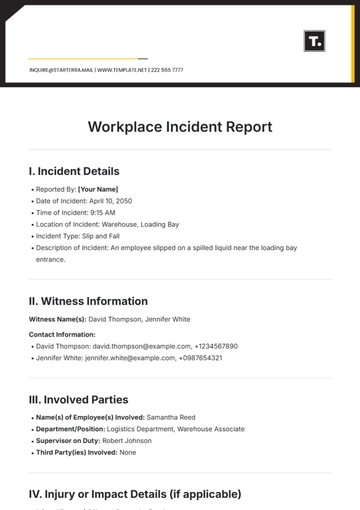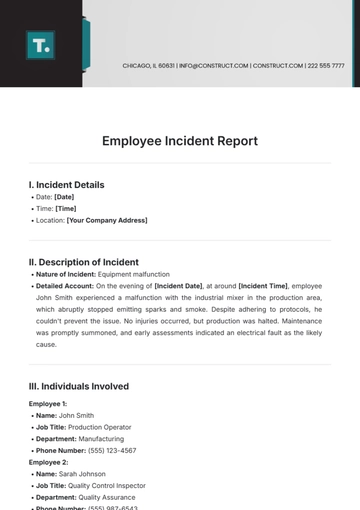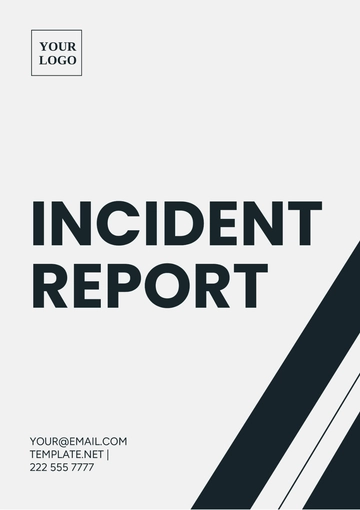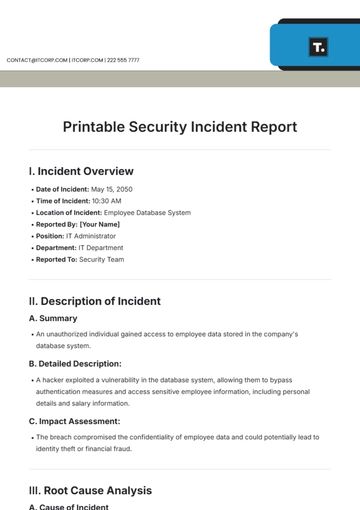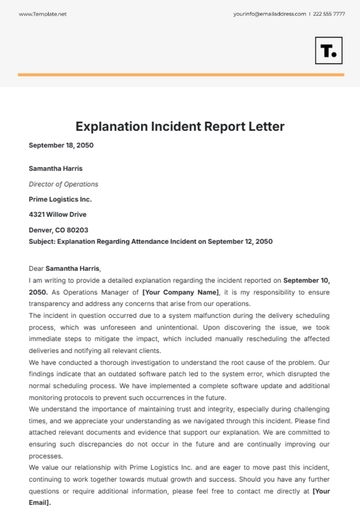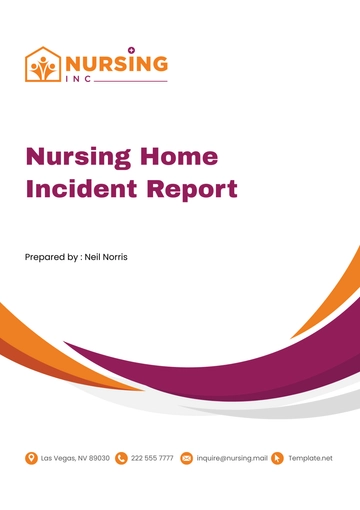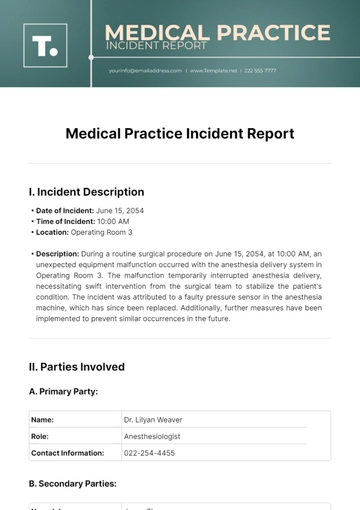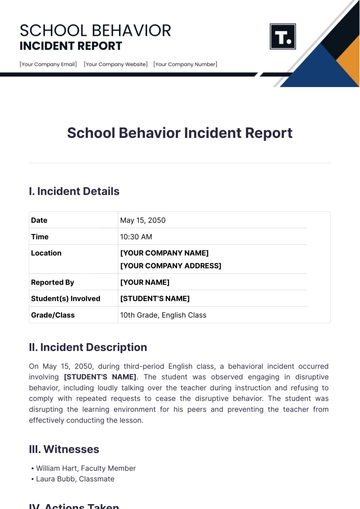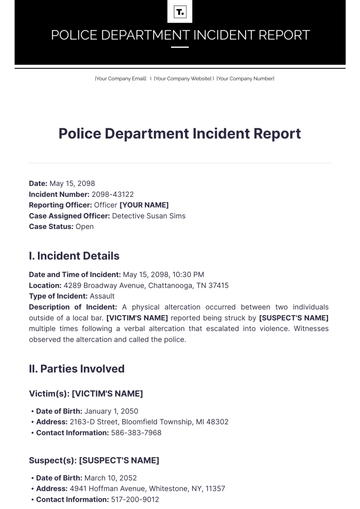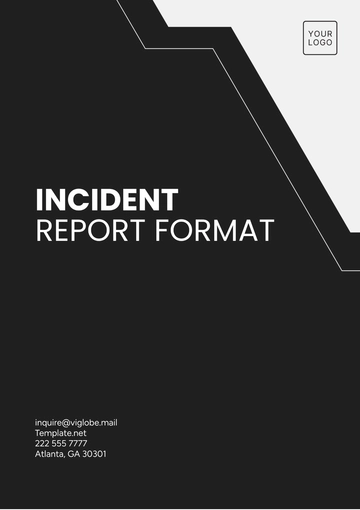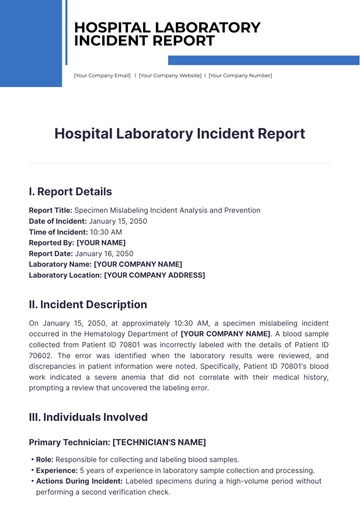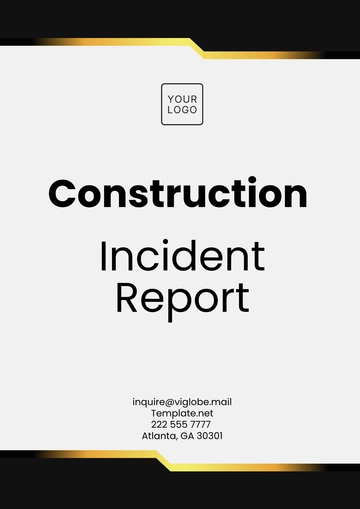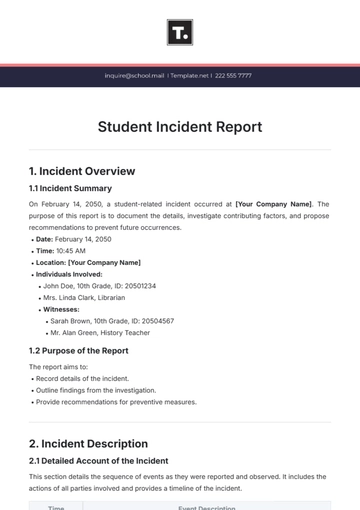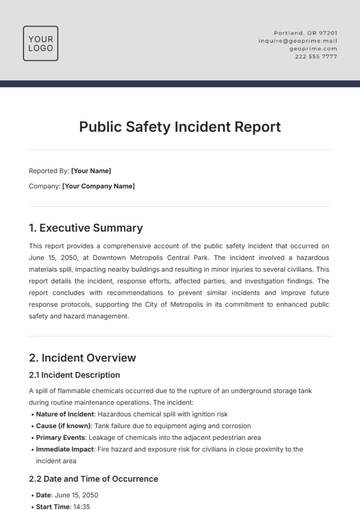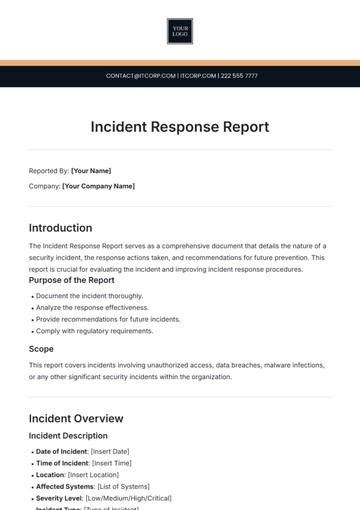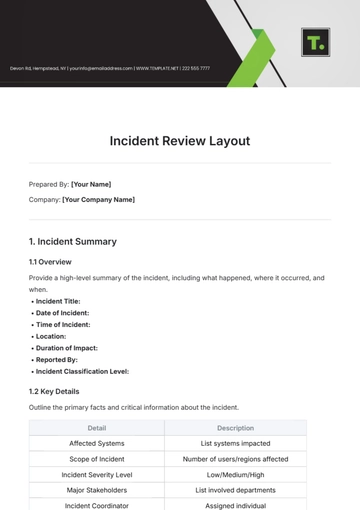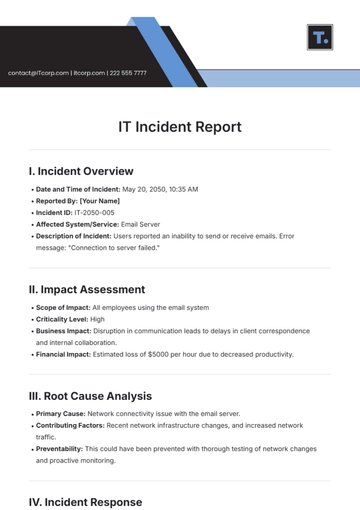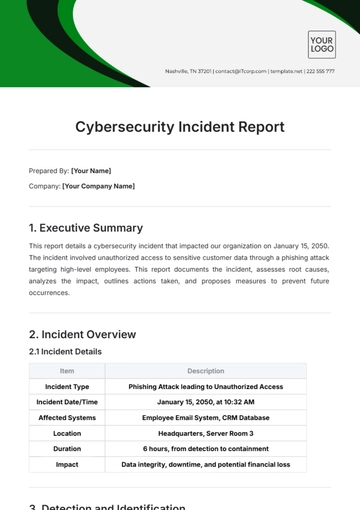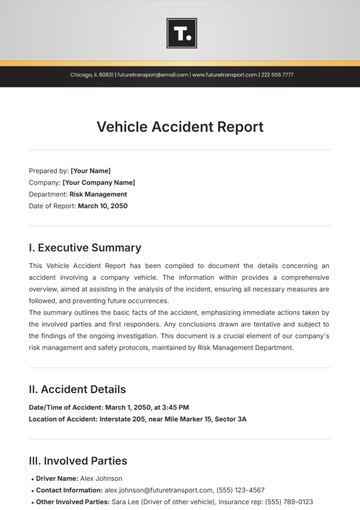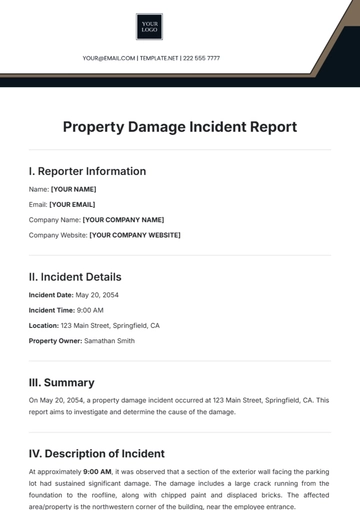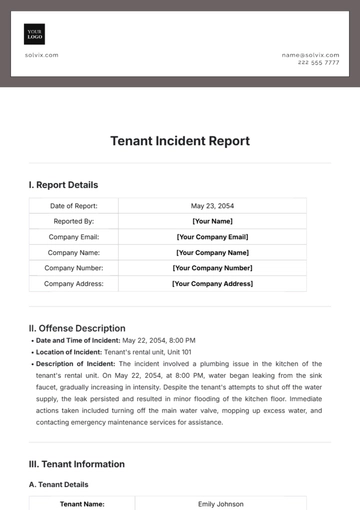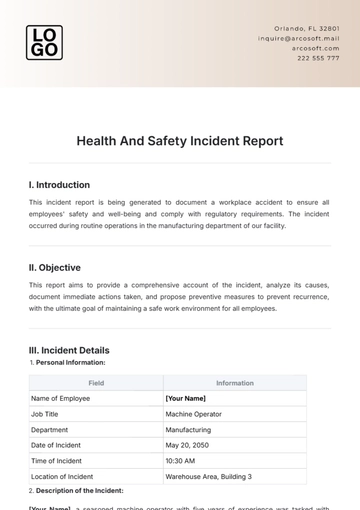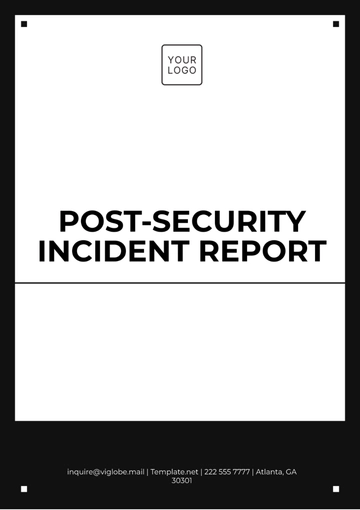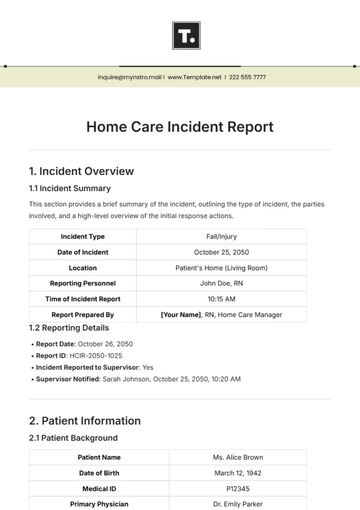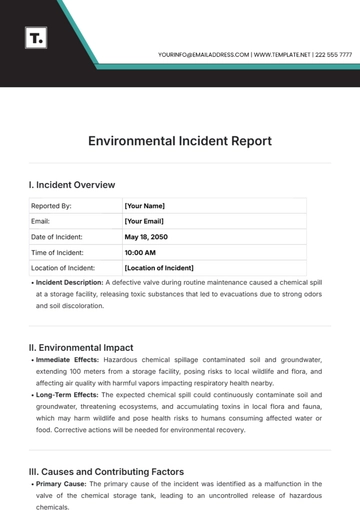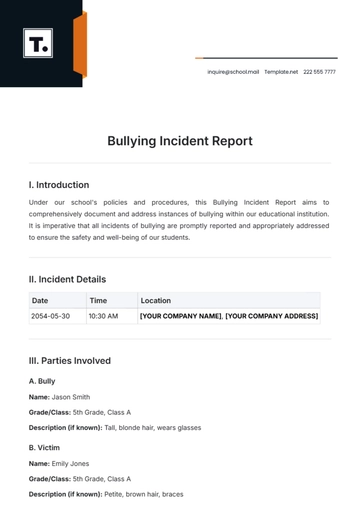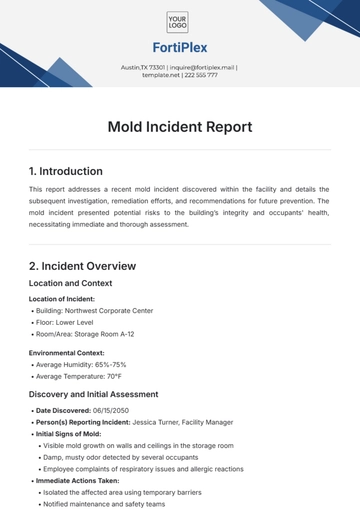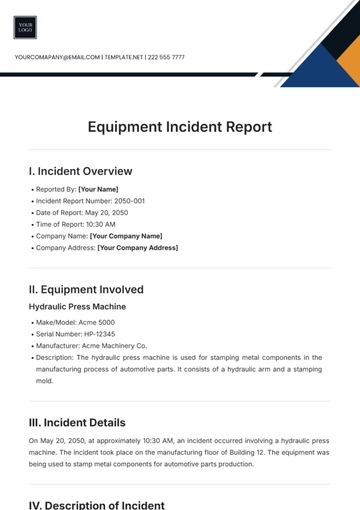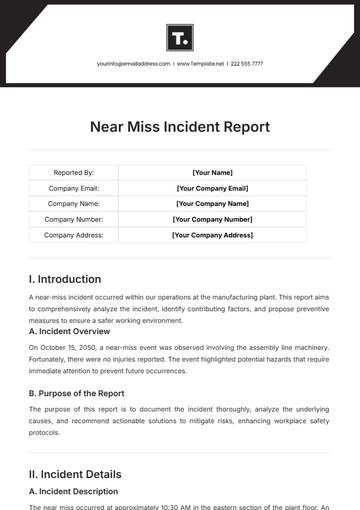Free Medical Incident Report Outline
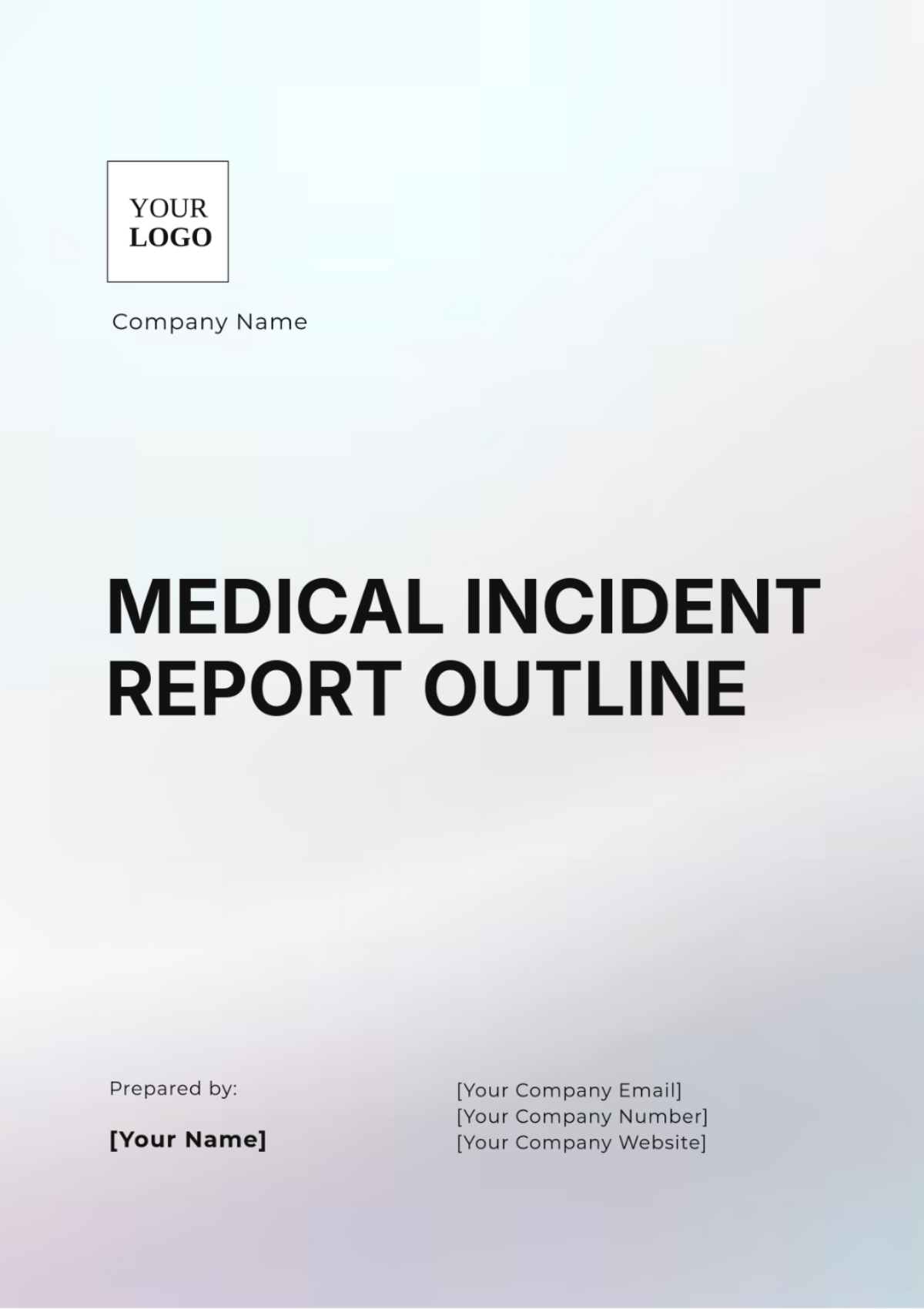
I. Report Overview
Date of Incident: Date of Incident
Time of Incident: Time of Incident
Reporting Individual:
Name: [Your Name]
Position/Title: Job title
Department: Department/Unit
Contact Information:
Phone Number: Direct line
Email Address: Professional email
II. Incident Details
Date of Incident: Date of Incident
Time of Incident: Time of Incident
Location of Incident:
Specific Location: Room number, department, or area
Facility Name: Hospital/clinic name
Description of Environment: Brief description of the setting, including any hazards or relevant conditions
Description of Incident:
Narrative of Events: Provide a detailed chronological account of the incident, specifying:
Initial circumstances leading to the incident
Actions taken by involved parties before the incident
Exact nature of the incident
Contributing Factors: Identify any factors contributing to the incident, including:
Environmental issues (e.g., wet floors, equipment malfunction)
Human errors (e.g., communication breakdown, procedural lapses)
Equipment-related issues
III. Individuals Involved
Staff Involved:
Name(s) and Role(s): List of all staff involved, including their titles, roles, and any relevant training
Involvement in the Incident: Brief description of their involvement
Witnesses:
Name(s) and Contact Information: List witnesses, including their roles and contact details
Witness Statements: Summary of what each witness observed
IV. Incident Description
Type of Incident:
(e.g., fall, medication error, equipment failure, adverse drug reaction)
Immediate Actions Taken:
Medical Interventions: Describe all actions taken immediately following the incident:
First aid measures
Notifications to emergency services or other departments
Patient and Family Communication: Document any information provided to the patient and their family regarding the incident.
Assessment of Injuries:
Type and Severity of Injuries: Detail all injuries sustained:
Body part(s) affected
Severity classification (e.g., minor, moderate, severe)
Initial medical assessment findings
Treatment provided
V. Follow-Up Actions
Further Medical Evaluation:
Recommended Tests or Treatments: Specify any tests ordered and treatments initiated following the incident.
Referrals: List any referrals made to specialists or additional medical personnel.
Notifications:
Individuals Notified: Include names and titles of individuals or departments notified about the incident (e.g., supervisors, quality assurance, risk management).
Preventive Measures:
Recommendations: Outline suggested changes or interventions to prevent similar incidents in the future:
Policy changes
Training or educational needs identified
Equipment maintenance or replacement recommendations
VI. Additional Information
Attachments:
Relevant Documents: Include any supporting documentation, such as:
Photographs of the scene
Incident checklists
Clinical notes or assessments
Investigation Summary:
Findings and Conclusions: Provide a summary of any investigations conducted, including:
Conclusions drawn from the investigation
Analysis of contributing factors
Recommendations based on investigation findings
- 100% Customizable, free editor
- Access 1 Million+ Templates, photo’s & graphics
- Download or share as a template
- Click and replace photos, graphics, text, backgrounds
- Resize, crop, AI write & more
- Access advanced editor
Document comprehensive patient history with the Medical History Report Template from Template.net. This editable and customizable template is perfect for recording patient details, and it’s editable in our Ai Editor Tool for quick and easy modifications.
You may also like
- Sales Report
- Daily Report
- Project Report
- Business Report
- Weekly Report
- Incident Report
- Annual Report
- Report Layout
- Report Design
- Progress Report
- Marketing Report
- Company Report
- Monthly Report
- Audit Report
- Status Report
- School Report
- Reports Hr
- Management Report
- Project Status Report
- Handover Report
- Health And Safety Report
- Restaurant Report
- Construction Report
- Research Report
- Evaluation Report
- Investigation Report
- Employee Report
- Advertising Report
- Weekly Status Report
- Project Management Report
- Finance Report
- Service Report
- Technical Report
- Meeting Report
- Quarterly Report
- Inspection Report
- Medical Report
- Test Report
- Summary Report
- Inventory Report
- Valuation Report
- Operations Report
- Payroll Report
- Training Report
- Job Report
- Case Report
- Performance Report
- Board Report
- Internal Audit Report
- Student Report
- Monthly Management Report
- Small Business Report
- Accident Report
- Call Center Report
- Activity Report
- IT and Software Report
- Internship Report
- Visit Report
- Product Report
- Book Report
- Property Report
- Recruitment Report
- University Report
- Event Report
- SEO Report
- Conference Report
- Narrative Report
- Nursing Home Report
- Preschool Report
- Call Report
- Customer Report
- Employee Incident Report
- Accomplishment Report
- Social Media Report
- Work From Home Report
- Security Report
- Damage Report
- Quality Report
- Internal Report
- Nurse Report
- Real Estate Report
- Hotel Report
- Equipment Report
- Credit Report
- Field Report
- Non Profit Report
- Maintenance Report
- News Report
- Survey Report
- Executive Report
- Law Firm Report
- Advertising Agency Report
- Interior Design Report
- Travel Agency Report
- Stock Report
- Salon Report
- Bug Report
- Workplace Report
- Action Report
- Investor Report
- Cleaning Services Report
- Consulting Report
- Freelancer Report
- Site Visit Report
- Trip Report
- Classroom Observation Report
- Vehicle Report
- Final Report
- Software Report
